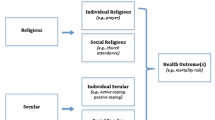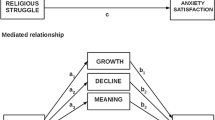Abstract
Interviewed 96 undergraduates about their coping with the recent death of a close friend. Measures assessed characteristics of: (a) the event (e.g., months since death); (b) the respondent (e.g., intrinsic and extrinsic religiousness); (c) religious and nonreligious causal appraisals; (d) religious and nonreligious coping strategies; and (e) general and event-related outcomes (e.g., dysphoria, personal growth). Data were analyzed by path analysis and models were constructed for each outcome variable, showing how each of the elements of the coping process was predictive of later elements in the models. As expected, person and event variables, attributions, and coping activities were predictive of each outcome in complex ways. One intriguing set of findings concerned the complex role of intrinsic religiousness, which was indirectly related to increased personal growth and decreased dysphoria, but was directly related to increased event-related distress. Overall, the results point to the important role of religion in the coping process.
Similar content being viewed by others
References
Allport, G. W. (1966). The religious context of prejudice.Journal for the Scientific Study of Religion, 5 447–457.
Allport, G. W., & Ross, J. (1967). Personal religious orientation and prejudice.Journal of Personality and Social Psychology, 5 432–443.
Batson, C., & Ventis, W. (1982).The religious experience: A social-psychological perspective. New York: Oxford University Press.
Beck, A. (1967).Depression: Clinical, experimental, and theoretical perspectives. New York: Harper & Row.
Benson, P., & Spilka, B. (1973). God image as a function of self-esteem and locus of control.Journal for the Scientific Study of Religion, 12 297–310.
Bergin, A. (1990, August).Religion, prevention, and mental health. William James Address at the Annual Meeting of the American Psychological Association, Boston.
Caplan, G. (1964).Principles of preventive psychiatry. New York: Basic Books.
Carver, C., Scheier, M., & Weintraub, J. (1989). Assessing coping strategies: A theoretically-based approach.Journal of Personality and Social Psychology, 56 267–283.
Donahue, M. (1985). Intrinsic and extrinsic religiousness: Review and meta-analysis.Journal of Personality and Social Psychology, 48 400–419.
Downey, G., Silver, R., & Wortman, C. (1990). Reconsidering the attribution-adjustment relationship following a major negative event: Coping with the loss of a child.Journal of Personality and Social Psychology, 59 925–940.
Duncan, D. (1975).Introduction to structural equation models. New York: Academic Press.
Feagin, J. (1964). Prejudice and religious types: A focused study of Southern Fundamentalists.Journal for the Scientific Study of Religion, 4 3–13.
Glock, C., & Stark, R. (1966).Christian beliefs and antisemitism. New York: Harper & Row.
Gorsuch, R., & Smith, C. (1983). Attributions of responsibility to God: An interaction of religious beliefs and outcomes.Journal for the Scientific Study of Religion, 22 340–352.
Hall, C. (1986). Crisis as opportunity for spiritual growth.Journal of Religion and Health, 25 8–17.
Horowitz, M., Wilner, N., & Alvarez, W. (1979). Impact of Event Scale: A measure of subjective stress.Psychosomatic Medicine, 41 209–218.
Jereskog, K., & Sorbon, D. (1989).LISREL 7: A guide to the program and applications. Chicago: SPSS Inc.
Lazarus, R., & Folkman, S. (1984).Stress, appraisal and coping. New York: Springer.
Maton, K. (1989). The stress-buffering role of spiritual support: Cross-sectional and prospective investigations.Journal for the Scientific Study of Religion, 28 310–323.
McIntosh, D., Silver, R., & Wortman, C. (1991).Religion's role in adjustment to a negative life event: Coping with the loss of a child. Unpublished manuscript, University of Denver, Department of Psychology, Denver.
Mirels, H. (1970). Dimensions of internal versus external control.Journal of Consulting and Clinical Psychology, 34 226–228.
O'Brien, M. (1982). Religious faith and adjustment to long-term hemodialysis.Journal of Religion and Health, 21 68–80.
Pargament, K. (1990). God help me: Toward a theoretical framework of coping for the psychology of religion.Research in the Social Scientific Study of Religion, 2 195–224.
Pargament, K., Ensing, D., Falgout, K., Olsen, H., Reilly, B., Van Haitsma, K., & Warren, R. (1990). God help me: (I.) Religious coping efforts as predictors of the outcomes to significant life events.American Journal of Community Psychology, 18 793–824.
Pargament, K., & Hahn, J. (1986). God and the just world: Causal and coping attributions to God in health situations.Journal for the Scientific Study of Religion, 25 193–207.
Park, C., & Cohen, L. (1992). Religious beliefs and practices and the coping process. In B. Carpenter (Ed.)Personal coping: Theory, research, and application (pp. 185–198). New York: Praeger.
Park, C., Cohen, L., & Herb, L. (1990). Intrinsic religiousness and religious coping as life stress moderators for Catholics versus Protestants.Journal of Personality and Social Psychology, 59 562–574.
Princeton Religious Research Center (April, 1988).Emerging trends. Princeton, NJ: Author.
Rotter, J. (1966). Generalized expectancies for internal versus external control reinforcement.Psychological Monographs, 80 (1, Whole No. 609).
Schoenrade, P., Ludwig, G., Atkinson, T., & Shane, R. (1990, November).Whose loss? Intrinsic religion and the consideration of one's own or another's death. Paper presented at the Annual Meeting of the Society for the Scientific Study of Religion, Virginia Beach, VA.
Smith, P., Range, L., Ulmer, A., & Bodet, J. (1989, August).Belief in afterlife and bereavement outcome. Paper presented at the Annual Meeting of the American Psychological Association, New Orleans.
Spielberger, C., Gorsuch, R., & Lushene, R. (1970).Manual for the State-Trait Anxiety Inventory. Palo Alto, CA: Consulting Psychologists Press.
Spilka, B., Armatas, P., & Nussbaum, J. (1964). The concept of God: A factor analytic approach.Review of Religious Research, 6 28–36.
Spilka, B., Hood, R., & Gorsuch, R. (1985).The psychology of religion: An empirical approach. Englewood Cliffs, NJ: Prentice-Hall.
Spilka, B., Shaver, P., & Kirkpatrick, L. (1985). A general attribution theory for the psychology of religion.Journal for the Scientific Study of Religion, 24 1–20.
Taylor, S., Lichtmann, R., & Wood, J. (1984). Attributions, beliefs about control, and adjustment to breast cancer.Journal of Personality and Social Psychology, 46 489–502.
Wortman, C., & Silver, R. (1989). The myths of coping with loss.Journal of Consulting and Clinical Psychology, 57 349–357.
Author information
Authors and Affiliations
Additional information
This article is based in part on a dissertation by Crystal Park under the supervision of Lawrence H. Cohen in the Department of Psychology at the University of Delaware. We are extremely grateful to David Kaplan for his invaluable help with the statistical analyses.




